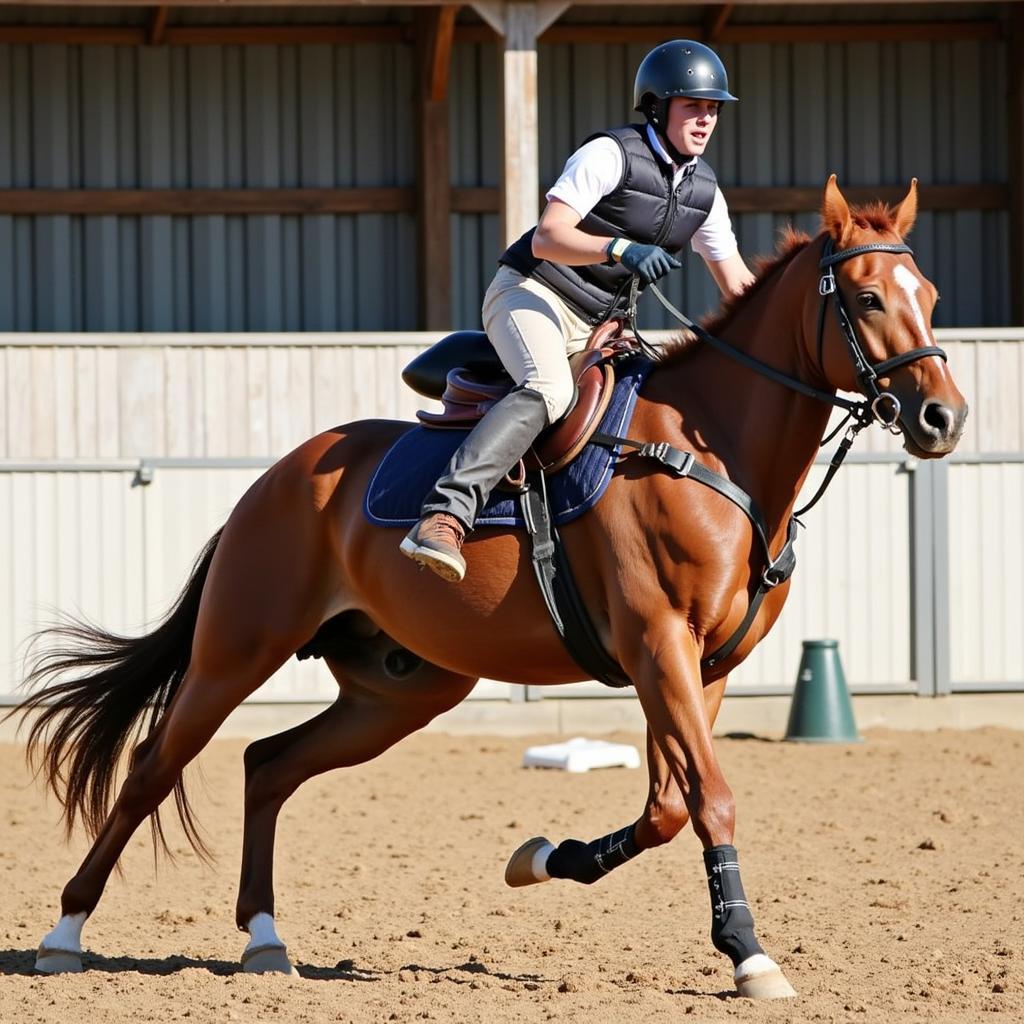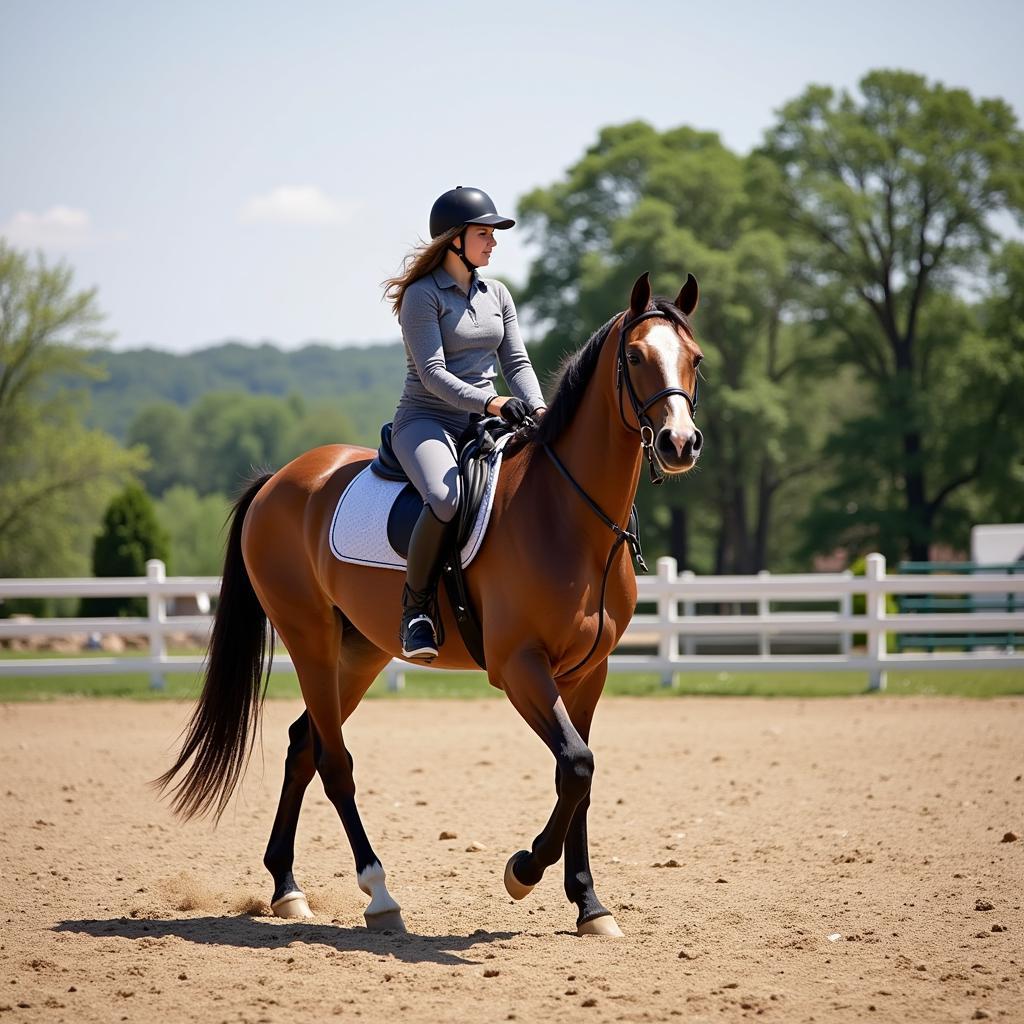Annie Goodman Horse Accident, a phrase that resonates with many equestrians, highlights the inherent risks in horse riding. While we don’t have specific details about an incident involving someone named Annie Goodman, this article aims to discuss common horse-related accidents, their causes, and crucial preventative measures. Understanding these aspects is essential for every rider, ensuring both their safety and the well-being of their equine partners.
Common Causes of Horse Riding Accidents
Falls are the most frequent type of horse riding accident. They can result from a variety of factors, including:
- Spooking: A sudden, unexpected movement by the horse, often triggered by an unfamiliar sight or sound.
- Tripping or Stumbling: Uneven terrain, obstacles, or the horse’s own misstep can lead to falls.
- Bucking or Rearing: These are more deliberate actions by the horse, often in response to discomfort, fear, or improper handling.
- Equipment Failure: Broken tack, such as reins or stirrup leathers, can contribute to accidents.
- Rider Error: Inexperience, poor balance, or incorrect riding techniques can increase the risk of falling.
 Horse Riding Fall Prevention Tips
Horse Riding Fall Prevention Tips
Preventing Horse Riding Accidents: Proactive Steps for Safety
Preventing horse accidents involves a multi-pronged approach encompassing rider preparation, horse care, and environmental awareness. Here are some key steps to minimize risks:
- Appropriate Riding Attire: Always wear a properly fitted helmet designed for equestrian activities. Consider a safety vest for added protection, especially when jumping or engaging in more challenging riding disciplines.
- Regular Tack Inspection: Before each ride, meticulously inspect all tack for signs of wear and tear. Ensure everything is in good working order and properly adjusted.
- Suitable Riding Environment: Choose safe riding areas free from hazards like holes, low-hanging branches, and excessive traffic. Be mindful of the terrain and adjust your riding style accordingly.
- Progressive Training: Riders should gradually progress through different skill levels, building confidence and competence before tackling more challenging maneuvers. Proper instruction from a qualified instructor is invaluable.
 Choosing a Safe Horse Riding Environment
Choosing a Safe Horse Riding Environment
The Importance of Horse Care in Accident Prevention
A well-cared-for horse is a safer horse. Regular veterinary checkups, proper hoof care, and a balanced diet contribute to a horse’s overall well-being and reduce the likelihood of behavioral issues that could lead to accidents.
- Health and Soundness: Ensure your horse is physically sound and free from any ailments that might affect its performance or behavior.
- Temperament and Training: Understand your horse’s temperament and train it appropriately. Consistent training builds trust and communication, making the horse more responsive and predictable.
- Recognizing Signs of Stress: Learn to recognize signs of stress or discomfort in your horse, such as pinning ears, tail swishing, or an elevated heart rate. Addressing these issues can prevent potential accidents.
“A calm and confident horse is a key component of a safe riding experience,” says Dr. Emily Carter, DVM, equine veterinarian and seasoned rider. “Regular veterinary care, along with attentive observation of your horse’s behavior, can help identify and address potential problems before they escalate.”
Conclusion: Prioritizing Safety in Equine Activities
Annie Goodman horse accident serves as a reminder that horse riding, while rewarding, carries inherent risks. By understanding these risks and taking proactive steps to mitigate them, we can create a safer environment for both ourselves and our equine companions. Remember, prioritizing safety is paramount to enjoying the equestrian lifestyle to the fullest.
FAQ
- What are the most common horse riding injuries?
- How can I choose a safe riding helmet?
- What should I do if my horse spooks while I’m riding?
- How can I tell if my horse is stressed or uncomfortable?
- What are some essential safety checks to perform on my tack before riding?
- What are the benefits of taking riding lessons from a certified instructor?
- How can I create a safer riding environment for myself and my horse?
Need further assistance? Contact us at Phone: 0772127271, Email: [email protected] Or visit us at QGM2+WX2, Vị Trung, Vị Thuỷ, Hậu Giang, Việt Nam. We have a 24/7 customer support team.